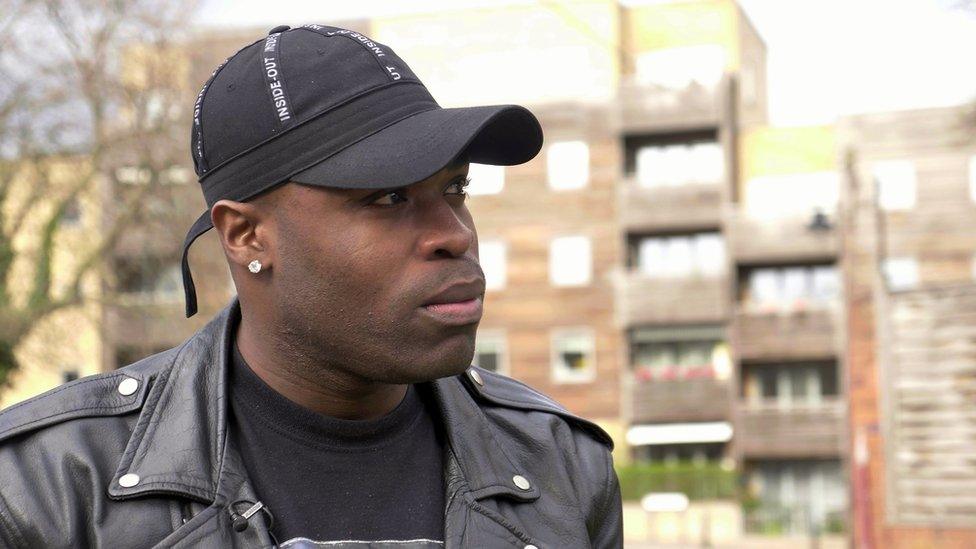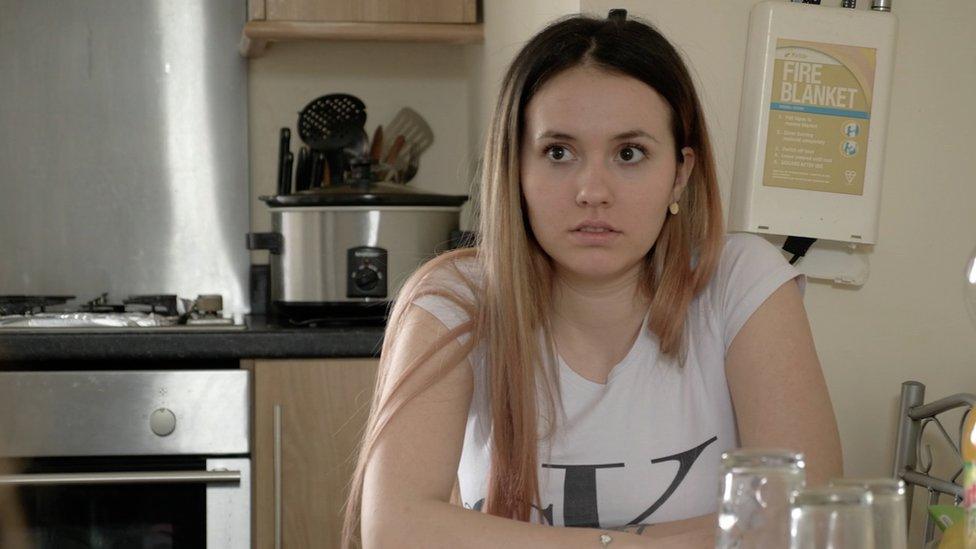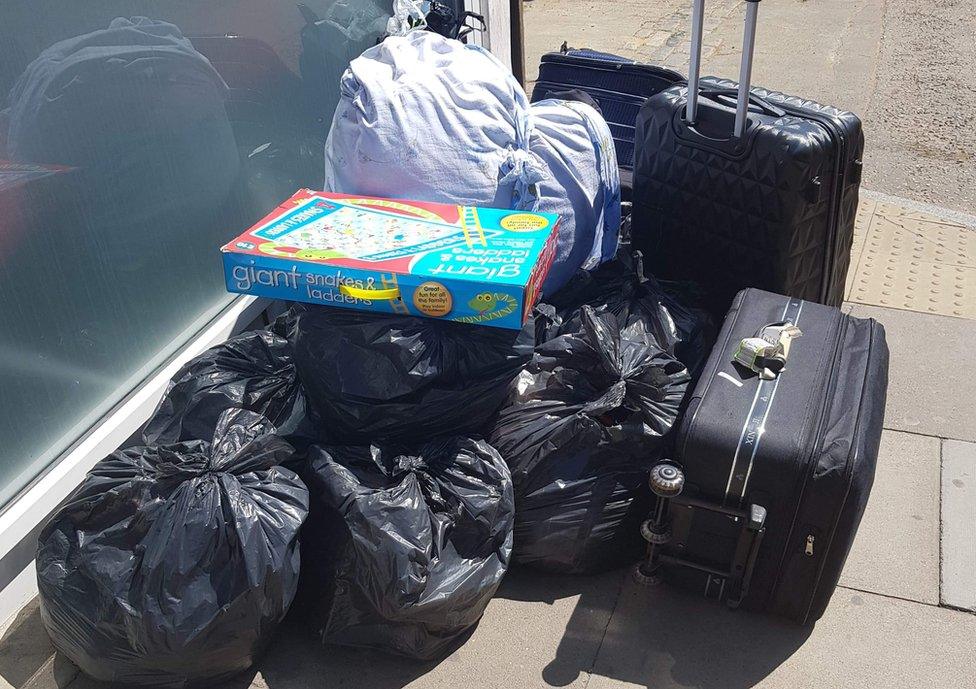Agency 'locking out tenants and taking belongings'
- Published
Julius Agyei says his clothes and passport were taken from his room
A letting agency has been illegally evicting tenants and taking their belongings, the BBC's Victoria Derbyshire programme has been told.
Three tenants said they arrived home to find locks had been changed and rooms emptied.
Some said their possessions had not yet been returned. Others said their belongings were given back in bin bags, left on the street outside the agency.
Flintons, in east London, said it "strongly denies" the claims.
BBC News has previously reported that Flintons demanded hundreds of pounds before prospective tenants were allowed to view properties for rent, which it denied.
Figures show just 18 landlords were convicted of illegal eviction in England and Wales in 2018.
The charity Citizens Advice said it had logged 2,164 complaints about the problem in the same period.
'Everything gone'
Julius Agyei rented a room, through Flintons, in a shared flat in east London last year.
The letting agency provides short-term rentals, usually to young professionals and students.
At one stage, he says he was charged extra fees for late payment of rent, which he disputes and was in discussions with Flintons to resolve.
But then, in December 2018, he arrived home to find the key to his room would not work.
And when a locksmith eventually let him in, his room was empty.
"Everything was gone," he says.
"They'd taken literally all my clothes, my towels, my passport, they even took my bed sheets around my bed."

Julius Agyei says his clothes and passport were removed
Flintons disputes that Julius was locked out of his room or that his possessions were removed.
It says he told them in a phone call, two days before, that he had already moved out and a later inspection found the room apparently abandoned.
Julius strongly denies that.
"Every day I'm just thinking, 'Why has this happened to me? I haven't done anything. I'm here trying to work, mind my own business,'" he says.
He said he was now planning to take legal action to make the agency return his belongings or pay compensation.
Flintons says it will "vigorously defend" any legal claim.
'Real inconsistency'
Under the Protection from Eviction Act 1977, it can be a criminal offence for a landlord or agency to evict a tenant without going to court to acquire a possession order.
The number of complaints has been rising in England and Wales, driven by a sharp increase in people renting privately.
The charity Citizens Advice said 2,164 people had reported the problem in 2018-19, up from 1,415 in 2014-15.
But the evidence threshold for a prosecution is high and according to the latest figures from the Ministry of Justice, only 47 complaints led to a prosecution in 2018.

Georgiana and her partner, Stan, were awarded £400 in compensation
There were 18 convictions, and, in the most serious cases, two people received a jail sentence.
Support workers believe the true scale of the problem is hard to measure, as many tenants will simply find a new place to live without going to the authorities.
David Hickling, who chairs the Association of Tenancy Relations Officers, says local authorities have no statutory duty to act in cases where private tenants suffer harassment or unlawful eviction.
And even after a conviction, there is a wide variation in sentencing, with fines ranging from a few hundred to tens of thousands of pounds for what look like very similar offences.
The BBC is not aware of any criminal investigation into Flintons related to allegations of illegal eviction.
One couple, Stan Cristinel and Georgiana Militaru, say they were left hundreds of pounds out of pocket after renting a room with Flintons.
After falling behind with some rent payments, they say, they came home to find their door wide open and their belongings gone.
They say there was no warning letter or phone call from the agency.
"This was the room when I came home," Stan says, pointing to photos he took at the time. "I found nothing, nothing [in the room]."
The couple complained to Flintons and say they paid £450 to get their belongings back - which were left in bin bags in the street outside the agency.

Stan and Georgiana say their possessions were left out in the street outside the agency
Responding to the allegation, Flintons produced a receipt saying the £450 fee had been for breaking their contract early, though the couple, originally from Romania, deny that was the case.
The pair went to Citizens Advice, which helped take their complaint to the property ombudsman.
Ten months later, Flintons was ordered to pay them £400 in compensation for breaching the ombudsman's code of practice, though the ombudsman said it could not rule on the legality of the eviction itself.
Flintons says Stan and Georgiana left the property "of their own free will" and the ombudsman's ruling came after it had failed to submit paperwork because of an "administrative oversight".
'National training'
In October 2017, the UK government said it would take action to license letting agents, with plans to set minimum standards and put in place an independent regulatory body.
But no legislation has yet been introduced and discussions about what form it could take are ongoing, with a working group chaired by Lord Best due to report in July.
A spokesman for the Ministry of Housing, Communities and Local Government said: "We have given local authorities greater enforcement powers to tackle landlords who pursue illegal practices.
"These include updating relevant guidance, providing national training, and awarding £2.3m in grant funding to help local authorities implement these measures."
There are already stricter controls in Scotland and Wales, where agents must apply for a licence and can be refused if they do not meet certain standards.
In Northern Ireland, there are also plans to introduce new legislation - but after the collapse of the devolved executive and assembly in 2017, no further action has yet been taken.

Follow the BBC's Victoria Derbyshire programme on Facebook, external and Twitter, external - and see more of our stories here.
- Published29 November 2018

- Published15 April 2019
